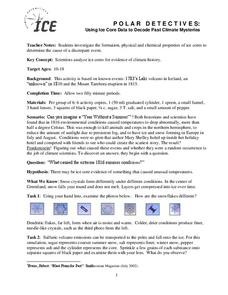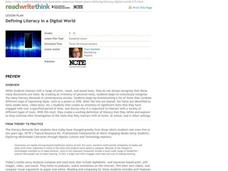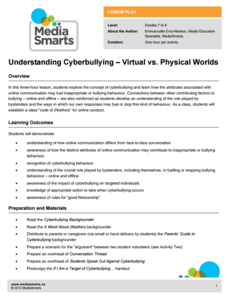Rainforest Alliance
Investments in Forest Carbon
One hundred metric tons of CO2 can accumulate in one acre of forest over time—that's a lot of carbon! In the activity, groups of middle school learners determine what makes forests important. They then solidify the concept by using a...
CPO Science
Potential and Kinetic Energy
Here's a resource ideal for independent learners who need extra reinforcement or would like to work ahead. These textbook chapters and practice problems cover many basic physics concepts, starting with potential and kinetic energy and...
Polar Trec
Polar Detectives: Using Ice Core Data to Decode Past Climate Mysteries
How does examining an ice core tell us about weather? Learners set up and explore fake ice cores made of sugar, salt, and ash to represent historical snowfall and volcanic eruptions. From their setups, scholars determine what caused the...
Yummy Math
Should NFL Quarterbacks Shave or Grow a Beard?
What does facial hair have to do with quarterback ratings? Using a set of data that provides QBR with and without facial hair, football enthusiasts determine if performance is affected. It also has learners question if the relationship...
Common Core Sheets
Comparing Visual Fractions
Introduce comparing fractions with a worksheet containing visual models. Young mathematicians must first identify the part being described in each model and then write greater than, less than, or equal to. Learners prepare to compare...
Read Works
Trading Pumpkins
Can you imagine a pumpkin patch without pumpkins? Learners read how Tammy's family solves their problem in a cooperative way, followed by a set of 10 reading comprehension questions.
Noyce Foundation
Part and Whole
Now you'll never have trouble cutting a cake evenly again. Here is a set of five problems all about partitioning shapes into a given number of pieces and identifying the fractional amount of each piece. As learners progress through the...
ReadWriteThink
Defining Literacy in a Digital World
What skills are necessary to interact with different types of text? Twenty-first century learners live in a digital world and must develop a whole new set of skills to develop media literacy. Class members engage in a series of...
Plimoth Plantation
Thanksgiving Interactive: You are the Historian
Take on the roles of two very different individuals living together during the same time: a pilgrim and a member from the Wampanoag Tribe. As learners navigate through the interactive, each click takes them to a part of each village to...
American Sign Language University
ASL Interactive
Go over the building blocks of American Sign Language with an interactive alphabet tool. As learners of all ages hover their cursors over a letter, the image of a hand changes to reflect that letter's sign in ASL.
101 Questions
Toilet Paper Roll
You won't want to flush a great lesson down the drain! An intriguing resource asks learners to predict the number of sheets of toilet paper on a roll. Presented with the dimensions of the roll and one sheet of paper, scholars make...
Goodwill Community Foundation, Inc.
Directions and Distances
Describe where you are—and find out where you are going—with a beginning Spanish resource on directions and maps. Spanish learners repeat and practice direction words such as norte, este, and oeste, as well as measurement terms such as...
US National Archives
Eastern Europe 1939-45 — Camps
Britain's decision not to bomb German death camps in World War II has provided many questions for historians, but with a primary source analysis lesson, high school students may be a step closer to finding out the truth. Learners read...
Education Bureau of Hong Kong
Mental Models
Behaviors are often based on assumptions. That's the big idea in the third lesson of a series of critical think resources. Through a series of worksheets, learners examine the conscious and heretofore unconscious assumptions that...
Smithsonian Institution
Art to Zoo: Life in the Promised Land: African-American Migrants in Northern Cities, 1916-1940
This is a fantastic resource designed for learners to envision what it was like for the three million African-Americans who migrated to urban industrial centers of the northern United States between 1910 and 1940. After reading a...
K12 Reader
The Thin Pin Can Spin
Words that end with -in are the focus on this worksheet. Learners read a short poem that includes quite a few -in words to identify and practice and then answer three reading comprehension questions.
K12 Reader
A Job for Bob
Get a handle on -ob words with a quick exercise. Learners first read a brief poem made up with many -ob words. They then response to three reading comprehension questions that are included on the page.
K12 Reader
Shut the Hut
Go with your gut and try out this worksheet that focuses on -ut words! Learners read a brief poem that includes many different words that end in -ut and then respond to three reading comprehension questions.
K12 Reader
Mom Will Find the Fox
Fox, box, shop, got... what do all of these words have in common? The short /o/ sound! Give your class some practice with the short /o/ poem by reading the poem on this worksheet. Learners also answer three included reading comprehension...
Media Smarts
Understanding Cyberbullying — Virtual vs. Physical Worlds
Spend a few days discussing cyberbullying with an engaging lesson plan. Opening discussion questions get the conversation started while quotes and articles continue thoughtful dialogue. Small group activities and role-play scenarios...
Curated OER
Most Likely/Least Likely
Learners consider a practice problem which prompts them to choose the type of marble most likely to be picked out of a group. Then, they answer probability-type questions regarding a spinner, and a tally chart of coins.
Worksheet Web
Using Pictographs
If one ice cream cone represents three ice cream scoops, and Bob has four ice cream cones, then how many scoops does Bob have? Learners solve these kind of questions with their new understanding of pictographs.
Mobile Education Store
ConversationBuilder
Some students struggle in social situations or when it comes to conversing with peers. Conversation is key in developing relationships and in building strong social skills. This app can be used to help children with social anxiety, ASD,...
Curated OER
Finding Meaning in the Badge
Children who are three to five years old study two rank badges from the Qing dynasty to develop an understanding of social rank, language skills, and symbolism. The lesson is discussion-based and requires learners to compare and contrast...
Other popular searches
- Diverse Learners
- Kinesthetic Learner
- English Language Learners
- Adult Learners
- Kinesthetic Learner Math
- Literacy Kinesthetic Learner
- Diversity of Learners
- Second Language Learners
- English Learners
- Learner Log
- Lessons for Diverse Learners
- Community of Learners























